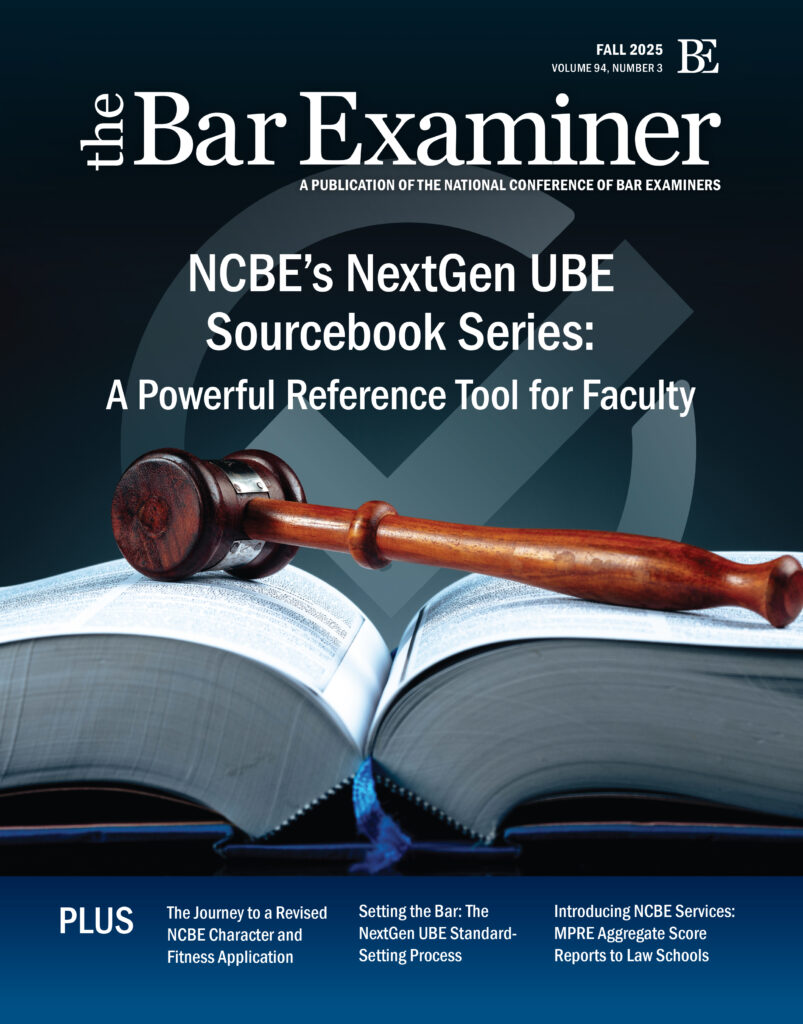This article originally appeared in The Bar Examiner print edition, Fall 2024 (Vol. 93, No. 3), pp. 3–4.By Judith A. Gundersen
 A Busy Fall of NextGen Development: Field Test Research and the Recent Prototype Exam
A Busy Fall of NextGen Development: Field Test Research and the Recent Prototype Exam
Nearly every jurisdiction will have released its July bar exam results by the time this issue goes to press. We are always very pleased for examinees (and jurisdictions) when performance improves and pass rates rise; this was the case in most jurisdictions this July. The bar exam, like high-stakes licensure exams in other professions such as medicine, dentistry, accounting, and nursing, is standardized—that is, such exams are equated from one administration to the next so that scores earned on any given exam represent the same level of examinees’ demonstrated competence. Scores don’t go up (or down) because a particular exam is easier (or harder) than those previous. Congratulations to all examinees who earned a passing score!
A segment of July 2024 examinees signed up to take the NextGen prototype exam held in October. Over 10,000 July examinees applied for the opportunity to do so. We aimed for roughly 2,000 examinees, so our research team selected those candidates who would best represent the demographics of the national examinee pool to help ensure our scoring, standard-setting, and concordance data are as accurate as possible. The prototype exam is an opportunity for NCBE to assess item quality, candidate experience, and technical performance, paving the way for us to make improvements before the new exam’s full launch in 2026.
In 2025 we will release a research report on the prototype exam and more information about the inaugural NextGen administration in July 2026. As I write this, we just released the research brief on the prior field test, available here.
We also have released a three-hour set of study aid questions that are indicative of the item types that will appear on the NextGen exam. We expect to release another similar set later this year.
This fall, I had the opportunity to attend the Arkansas Law Review Symposium at the University of Arkansas School of Law in Fayetteville. My sincere thank you to Dean Cynthia Nance and members of the Arkansas Law Review for the invitation and the hospitality. And congratulations to Dean Nance and the school of law for celebrating 100 years of excellence in legal education!
The symposium’s theme was exploring the evolution of legal education. I joined a panel of experts on emerging issues, including changes to accreditation standards and generative artificial intelligence. At NCBE, we are ramping up to deploy the NextGen exam, but in law schools, preparing students for success on a new bar exam is an emerging issue.
We want to provide as much information as we can about all aspects of the exam so that candidates and faculty feel comfortable preparing for it. I had the chance to provide an update on where we stand with development and jurisdiction-by-jurisdiction adoption, a comparison of the similarities and differences between the current UBE and NextGen exam, and more. I also spoke about how our volunteer bar exam drafters—many of whom are law faculty—are thinking about how they might adjust their teaching and curricula to best prepare students to take the NextGen exam. The strategies are similar to those set forth in this magazine last summer. We also plan to host a webinar for faculty interested in hearing from our development team and volunteer drafting committee members ideas for enhancing teaching in light of the new exam.
On a completely different note, I can’t help but have the presidential election on my mind. Living in a swing state means unrelenting ads for multiple candidates at the state and national levels.
I mention the election only insofar as a reminder that Bar Examiner readers are a diverse community of lawyers, judges, and administrators committed to public service notwithstanding which political party they might support. No matter where or how you serve the profession and the public in lawyer admissions, you have a deep understanding of and respect for our governmental institutions and the rule of law. We all share an abiding interest in maintaining a bar admissions process that promotes fairness, public confidence, and welcomes a new generation of competent, ethical, and diverse lawyers to uphold justice. And these values must hold true well after the election and beyond.
Until the next issue,

Judith A. Gundersen
Contact us to request a pdf file of the original article as it appeared in the print edition.







